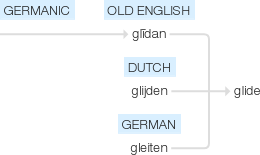Glide
Old English glīdan, of Germanic origin; related to Dutch glijden and German gleiten .
wiktionary
From Middle English gliden, from Old English glīdan, from Proto-West Germanic *glīdan, from Proto-Germanic *glīdaną, from Proto-Indo-European *ǵʰleydʰ-.
Cognate with West Frisian glide, glydzje, Low German glieden, Dutch glijden, German gleiten, Norwegian Nynorsk gli, Danish glide, Swedish glida.
etymonline
glide (v.)
Old English glidan "move along smoothly and easily; glide away, vanish; slip, slide" (class I strong verb, past tense glad, past participle gliden), from Proto-Germanic *glidan "to glide" (source also of Old Saxon glidan, Old Frisian glida, Old High German glitan, German gleiten), probably part of the large group of Germanic words in gl- involving notions of "smooth; shining; joyful," from PIE root *ghel- (2) "to shine." Related: Glided; gliding. Strong past tense form glid persisted into 20c.
glide (n.)
1580s, from glide (v.). From 1835 as a term in music; from 1889 as a step in dancing or a type of dance.
